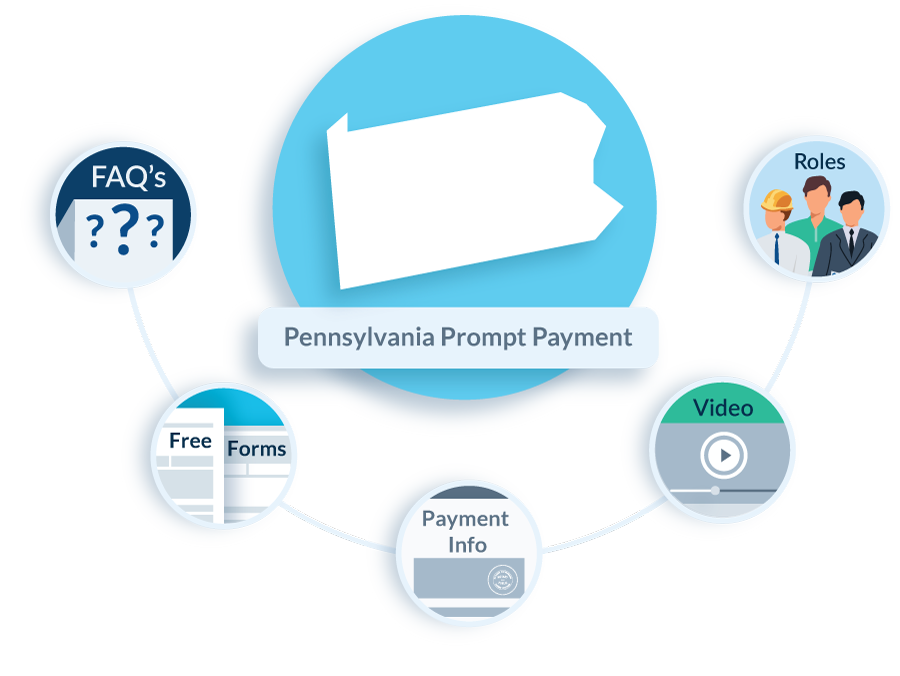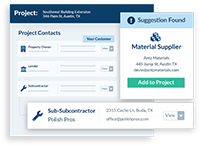Pennsylvania Prompt Payment Requirements
- Private Jobs
- Public Jobs
- Top Links
Prime Contractors
For Prime Contractors, progress payment must be made within 20 days of invoice. Final payment due within 30 days of final acceptance of project.
Subcontractors
For Subcontractors, payment due by later of 14 days after payment received from above, or 14 days after receipt of invoice.
Suppliers
For Suppliers, payment due by later of 14 days after payment received from above, or 14 days after receipt of invoice.
Interest & Fees
Interest at 1% per month. Penalty of 1% month for amounts withheld "wrongfully." Attorneys' fees to prevailing party.
Prime Contractors
For Prime (General) Contractors, progress payments due within 45 days of invoice (may be modified by contract). Final/retainage payments due within 45 days of final payment inspection (final payment inspection must occur within 30 days of request).
Subcontractors
For Subcontractors, payments due within 14 days of payment received from above.
Suppliers
For Suppliers, payments due within 14 days of payment received from above.
Interest & Fees
Interest at statutory rate. Plus an additional penalty of 1% month for amounts withheld in bad faith, along with attorneys' fees.
Prompt payment laws are a set of rules that regulate the acceptable amount of time in which payments must be made to contractors and subs. This is to ensure that everyone on a construction project is paid in a timely fashion. These statutes provide a framework for the timing of payments to ensure cash flow and working capital.
Projects Covered by Prompt Payment in Pennsylvania
The Pennsylvania prompt payment provisions are split into two sections, covering both private and public projects. These statutes govern the timing of all payments on construction projects, and impose penalties for late payment in the form of interest.
Private Projects
These rule found in 73 P.S. §501 et seq. apply to all private projects within the state except for two specific scenarios: (1) residential projects with 6 or fewer units, and (2) contracts for the purchase of materials by a person performing work on their own property. Most of the provisions governing payment on private projects are default provisions in case the contract terms are silent on the issue.
Payment Deadlines for Private Projects
Progress payments from property owners are due within 20 days of either the end of the billing cycle, or after delivery of the invoice; whichever is later. Final payments to prime contractors are due within 20 days of completion of the work.
As for payment to all other tiers of the payment chain, the deadline to pay is 14 days from either the day the paying party received payment from the owner, or from the day the payment invoice was received; whichever is later. If any submitted invoice is incorrect or claims too much, then the party receiving the invoice must give notice within 10 days of receipt. However, they are still obligated to pay the undisputed amounts within the statutory time period.
Penalties for Late Payment on Private Projects
If the work or materials are defective according to the contract terms, the paying party may withhold payment as long as they provide written notice within 7 calendar days. If any payments aren’t made within 7 days of the due date, 1% interest per month will accrue until payment is made. Additionally, if there is any evidence of bad faith, meaning arbitrary or vexatious withholding, the claimant will be awarded an additional 1% interest per month, along with attorney fees if they prevail in arbitration or litigation.
Public Projects
Pennsylvania public works project payment deadlines and penalties are regulated by 62 Pa. C.S. §3931 et seq.
Payment Deadlines for Public Projects
Prime contractors on Pennsylvania public works projects are to be paid in accordance with the contract terms. If there are no specific payment terms, then the prime must be paid within 45 days of the public entity’s receipt of the pay application. As for payments to all other tiers of project participants, once the hiring party receives payment, they have 14 days to release payment.
Again, if there is any defective work or materials, payments may be withheld. However, if this is the case, written notice must be given within 15 calendar days of receipt of the notice of defect.
The prompt pay provisions on public projects establishes a grace period for payment, if the contract doesn’t state one, then interest won’t accrue if payment is made on or before 15 calendar days after payment is due. If not, then the interest rate penalties for late payment on public projects accrue at different rates depending on a few factors.
Penalties for Late Payment on Public Projects
Late progress payments will accrue interest at the rate for overdue taxes set by the PA Secretary of Revenue. The interest applied to late final payments depends on whether the contract provided for retainage or not. If retainage is being withheld, then interest will accrue at 6% per year; if not, then the rate will be 10% per year. The bad faith additional 1% interest rate and attorney fees is also applicable to public projects as well.




